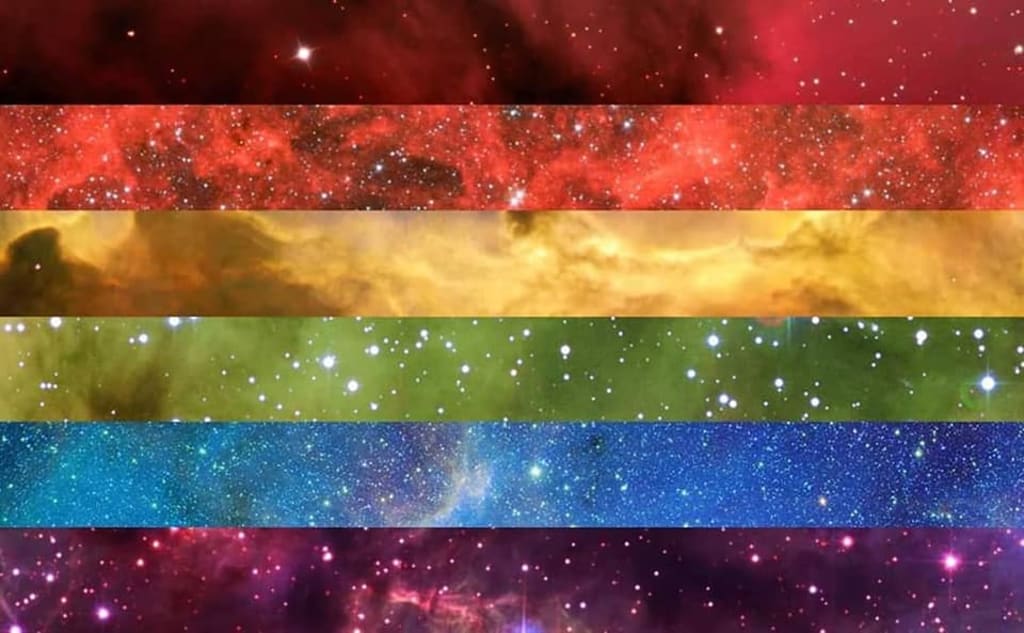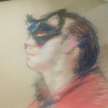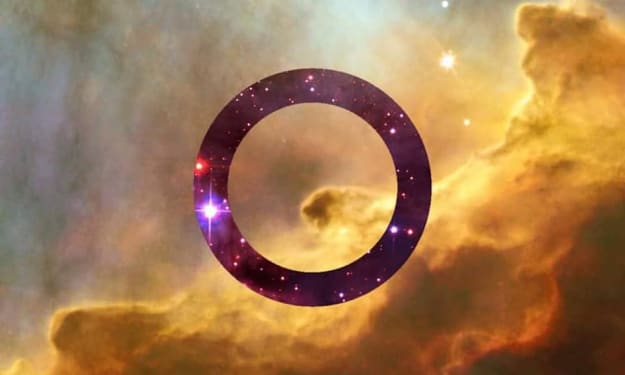Love Divine: VENUS VALLEY reads Martin Campbell's "The Love God"
Queer Philosophers' Forum, pt. 6

Time for a palate cleanser!
If this is your first time here, you've stumbled into a series where I release every chapter of my book-in-progress, each one an LGBTQIA+ centred philosophy teaching-&-learning piece, as a blog so you, queerly beloveds, can debate, discuss, question, contribute; your inputs become my edits, until the finished book represents a community of our voices. You're warmly welcome, gentles & lady-men, to the next chapter (which I had a lot more fun writing than the last one) of VENUS VALLEY - Queer Philosophers' Forum.
Now, onto what's palate cleansing about this one. To have a look at the time I spent picking apart the bigots' manifesto that is Helen Joyce's "Trans: When Ideology Meets Reality", and what it teaches us about the abuse and manipulation of language, click HERE. After the few weeks I spent in the purgatory of reading, researching, reviewing and replying to the first book that actually made me feel sick in quite a long time, I was given a copy of my friend (and fellow Pride-organiser) Martin Campbell's novel "The Love God" for my birthday, by him and his husband. It made the perfect relaxation to read, and the perfect contrast to write about, for this next visit to Venus Valley.
If you've spent any time learning, or even looking at, philosophy, you'll have seen a lot of "here's a thing from Greek times, and here's how it's relevant to today". Here in Venus Valley, we do that too, but make it queer.
The Love God tells the story of Antinous - "The Gay God" - the Emperor Hadrian's young lover, who was worshipped for a time alongside the Roman Pantheon for his blend of brains and beauty. Martin Campbell is a modern-day devotee of his divine memory, and, like I said before, one of the organisers of his and my hometown's Pride event. So he tells the story with a style of narration pretty unique to historical fiction: a modern voice, leaving us the readers clearly in the headspace of looking back on these epic romantic events from our present day perspective, instead of the usual author's design of taking us back into a long-gone world, soaking in the atmosphere of the past. Love Itself - Eros/Amor - is our narrator; opening every chapter with a reference to songs and stories of modern romance, both comic and tragic, from Wham tunes to Wuthering Heights quotes, and closing them with a remark directly to us the readers, openly admitting to being equal parts matchmaker and troublemaker, so even those of us who know a little bit about how the story ends won't know quite what's coming up next. Let me encourage you, my fellow queer philosophy folks, to learn a little lesson from this quirky writing style: immersing ourselves in ancient or foreign philosophies, so we can escape, cut off or insulate ourselves from the world outside the window today, can end up leaving us unable to show sympathy or empathy for any of the other points of view we could be listening to or learning from. Looking at the ancient roots of modern philosophy with it clear in our minds that these were the ways of the past, enjoying them from a distance, can bring us to a much better place of being able to thoroughly think things through.
Anyway, on to the story! For those of you who don't know the history at all: Emperor Hadrian lived in the 100's A.D. (or C.E. if you prefer); built monuments of Roman rule that are still standing today - from the famous wall that's still known by his name in northern Great Britain, to the Pantheon Temple in Rome itself - and took a young Greek boy, Antinous, as his companion and his heir, for his journey across the Greek and Egyptian borders of his rule. No spoilers for the version of the story Martin Campbell brings to the novel, but Hadrian outlived Antinous (but did Antinous fall, or was he pushed? Or is the truth somewhere between? You'll have to read it yourself to find out, and you'll have a great time if you do!) and in his grief for his loss, Hadrian honoured him and his love by granting him apotheosis: being worthy of worship, ascended to the heavens. Statues then stood featuring the face of Antinous Epiphanios on figures like Apollo in Athens and Osiris by the Nile river. If you've read any of Venus Valley before, you'll know one of my big starting points is knowing queer identities are nothing new and have been the way of the world throughout history. Antinous is one of the names that will pretty soon come up when someone like me tries to make that point. But world history was no kind of queer utopia; the poverty and prejudice the LGBTQIA+ community have to go through today is nothing new either. There's no sugar coating in the novel of the fact that it was an emasculating insult to be called a "Cinaedus" - an effeminate man; that there was a clear patriarchal social hierarchy between Erastes - sexually active, dominant men - and their Ephebes - sexually passive, submissive boys; nor that Hadrian's wife, Vibia Sabina, was stuck in their loveless, lonely and politically-expedient marriage; though she's given a young lady lover of her own, the noblewoman poetess Julia Balbilla (who travelled as her companion through Greece and Egypt, as Antinous did Hadrian, and whose poetry called Vibia Sabina "beautiful", "noble" and "lovely"). But that's painted as the traditionalist, what we'd call conservative today, side of the societies we meet in the novel. We see it through the eyes of two outsiders: Hadrian, old enough to have seen all there is to see of his world and be tired of it; and Antinous, young enough to have seen nothing outside his village and gaze dreamily at everything that's new to him in the world he watches from Hadrian's side. On their travels, as their bond grows from hero worship to romantic desire to sexual liberation, they cross lands watched over by hermaphrodite deities and their devotee eunuchs and temple prostitutes; and wish they could escape sexual expectations of their society, to live and love like the divine warrior companion couples in stories, like Alexander and Hephaestion, Achilles and Patroclus, Zeus and Ganymede. Jewish and Christian societies, who have the biggest reputation today for being judgemental about sexual "sin" back then, are brushed past as quickly as the story can allow. Now, I can understand if any Pagan believers, especially gay men, want to dwell as little as possible on the Christianity that dwells way too much on them and their "sin"; but this is my one critique note on the novel - it misses the chance to mention the famous "companions" couple of Jewish mythic history, David and Jonathan - whose closeness Oscar Wilde named, in his famous trial for gross indecency, as "the love that dare not speak its name". Biblical Hebrew language, after all, names six different sexes - but that's for another chapter! To the author's credit, he does give page space to Gnostic Christianity alongside the more orthodox kind, with its focus on the search for the divine spark in the heart, instead of up in heaven. That might be another chapter too. We'll see - if you're reading this through a link on a social media post, leave a comment there and let me know if you want it!
Now I'd love to carry on talking about what a fun and fascinating novel this was to read, or what a kind and clever man my friend the author is, but this is a philosophy blog. And my big reason for giving over a chapter to this novel - apart from what a sweet palate cleanser it was, after the self-induced torture of Helen Joyce's Trans - is because it's the perfect vehicle for taking our queer-centred trip through philosophy forward from ancient to modern times, by being a great introduction to a concept called Euhemerism. Named after Euhemerus, author of "Sacred History" (yes I know I just said we were moving on from ancient Greece, stay with me a second), it's the idea that all god-myths are stories of apotheosis, just like Antinous'. Sacred History itself might have been picked apart over the years since it was written, as not exactly being a paragon of accuracy. But the big ideas in it were useful for medieval Christians meeting Pagan cultures, as a way of explaining how their histories could be true, while still only one god was the "real" god. It was just as useful in the Renaissance for the rise of the new philosophy of Humanism. Books upon books have been written, and more will probably still be written, on both the Renaissance and postmodern versions of such an all-inclusive philosophy, but at its most basic it's this: Understanding how humanity made its way from where it was in the ancient past, to where it is today, can help us understand how - and give us faith that it's possible - to move forward from today into whatever our destiny may be in the distant future. Understand where we began, and we can see what we have the potential to become. During the Renaissance, when the western world was rising from the ashes of the Crusades and the plague, it gave a huge impulse to the study of arts and sciences; the subjects that when I went to school were called "Humanities" - history, geography and religion; and, of course, ancient and classical philosophy. Euhemerism gave the Renaissance Humanists a way of believing the Pagan Greek philosophers were still worth studying, despite the fact they believed goddesses lived in the ground and the Sun rode a chariot. After all, if we, let's say, turned up our noses at the Sherlock Holmes stories, just because they were written by a man who believed in ghosts and fairies, then we'd be robbing ourselves of one of the most intelligent, iconic and original queer characters in literature. Yes, side tangent, I did just say Sherlock Holmes is queer. Not only is his total absence of sexual or romantic expression, even when face to face with the woman of his dreams, or the closest male companion of his adult life, a solace for asexual readers, as they see themselves represented in one of the world's most famous and most favourite heroes; but the descriptions of Holmes' behaviour, voice and dress would have made him one big walking stereotype, to anyone who'd ever met a queer man in 1880's London. He's also, to bring us back to the point, a Humanist. In one of the many philosophical discussions in the books between Holmes and Watson (which are usually left out of the films and TV series so they can get on with the action), Holmes heartily recommends Watson reads "The Martyrdom of Man" by William Winwood Reade, one of the most influential writers on the Secular Humanist school of thought in his day - the equal importance of logic and ethics, in judging the value and virtue of humans as individuals and humanity as a whole.
One of the most world-famous postmodern visions of a Humanist future, is STAR TREK - which right now, despite its ever growing and devoted fandom (including me!), is surrounded by critics declaring its new spin-off shows "failures", for "going woke", for the heinous crime of (gasp!) featuring queer characters, played by queer actors and actresses, in storylines promoting queer acceptance. We'll be exploring their galactic vision in a future chapter - which the part of my brain that comes up with puns has decided to title TREKS & GENDER - yeah, I know... I'll see myself out.
In the meantime, I hope this epic romantic book, and the modern day revival of devotion to The Gay God that it represents, gets the chance to really, really annoy the "men's rights activists" and white supremacists who spend time on Tiktok and Twitter trying to paint the Roman Empire as some kind of patriarchal paradise, whose decline and fall was apparently brought about by the rise of multiculturalism and feminism in its ranks. Join us for our next chapter, FAKELORE - White Supremacy In Western Spirituality, for a well-deserved debunking of their world view and its poisonous roots.
I'll be adding Martin Campbell's The Love God, and William Winwood Reade's The Martyrdom of Man, to the recommended reading list for Venus Valley, which you can see in full by clicking HERE.
AVE ANTINOUS.
~*~
To get your own copy of Martin Campbell's "The Love God", click HERE;
For more info on the Pride event Martin and his husband have helped organise, which he'll be opening with a blessing of Antinous, click HERE;
To join the Venus Valley group on bookface where we debate, discuss, question, contribute, so your voice is heard alongside others, click HERE;
To donate to support the production and promotion of this blog as a fully fledged book, so our voices are heard louder and clearer, click HERE.
~*~
About the Creator
Mx. Stevie (or Stephen) Cole
Genderfluid
Socialist
Actor/actress
Tarot reader
Attracted to magic both practical & impractical
Writer of short stories and philosophical musings
Reader insights
Outstanding
Excellent work. Looking forward to reading more!
Top insights
Compelling and original writing
Creative use of language & vocab
Expert insights and opinions
Arguments were carefully researched and presented
Eye opening
Niche topic & fresh perspectives
On-point and relevant
Writing reflected the title & theme
Easy to read and follow
Well-structured & engaging content
Heartfelt and relatable
The story invoked strong personal emotions







Comments (9)
https://vocal.media/pride/the-bridge-of-destiny
nice
Oh crap- sorry about the caps
aS ALWAYS, SO LAYERED AND FULL OF INFORMATION. i APPRECIATE ALL OF THE WORK YOU PUT INTO THESE, AND HOW ENGAGING THEY ARE.
Very informative! Thanks. If you have a chance check out https://vocal.media/art/finding-the-wings-painted-from-life and also https://vocal.media/poets/this-king-son-of-david
This sounds like such a more pleasant read than anything from Helen Joyce. I remember reading a book about David & Johnathan back in the early 1980s that shocked my "fundamentalist" thought. Then I went to seminary where I was encouraged to consider what the scriptures actually say. Ever since, I've no longer been offended & wish I hadn't allowed some fundamentalist camp director take it away from me. (I always have been intrigued by his interest in reading it--to find out just how offensive it was, of course! But the intensity of his response has forever seemed to me more than simply spiritual concern. That & his seeming obsession with "sexual sin"!) I look forward to your coming chapters. As always, I deeply appreciate the work you are doing.
There is a lot to digest here. I really feel that in this day and age the LGBTQIA+ community is very misunderstood. Unfortunately there is a fair amount of intentional misinformation out there. Your article is refreshing as it intelligently discusses instances on this topic in Greek Mythology and within Biblical persona. You were able to tie in topics and subjects that most people can relate to. I am hoping to someday witness a broader acceptance. But it is going to have to begin with the loudest voices in our politics.
Well done!!!
Holy cow this is so weird because I was just talking to a friend and she’ was saying negative things about the trans community and I tried my best to defend them. I hope I did a good job! Anyway, good writing! Great work! Keep it up!